Burt A. The Evolution of the British Empire and Commonwealth From the American Revolution
Подождите немного. Документ загружается.

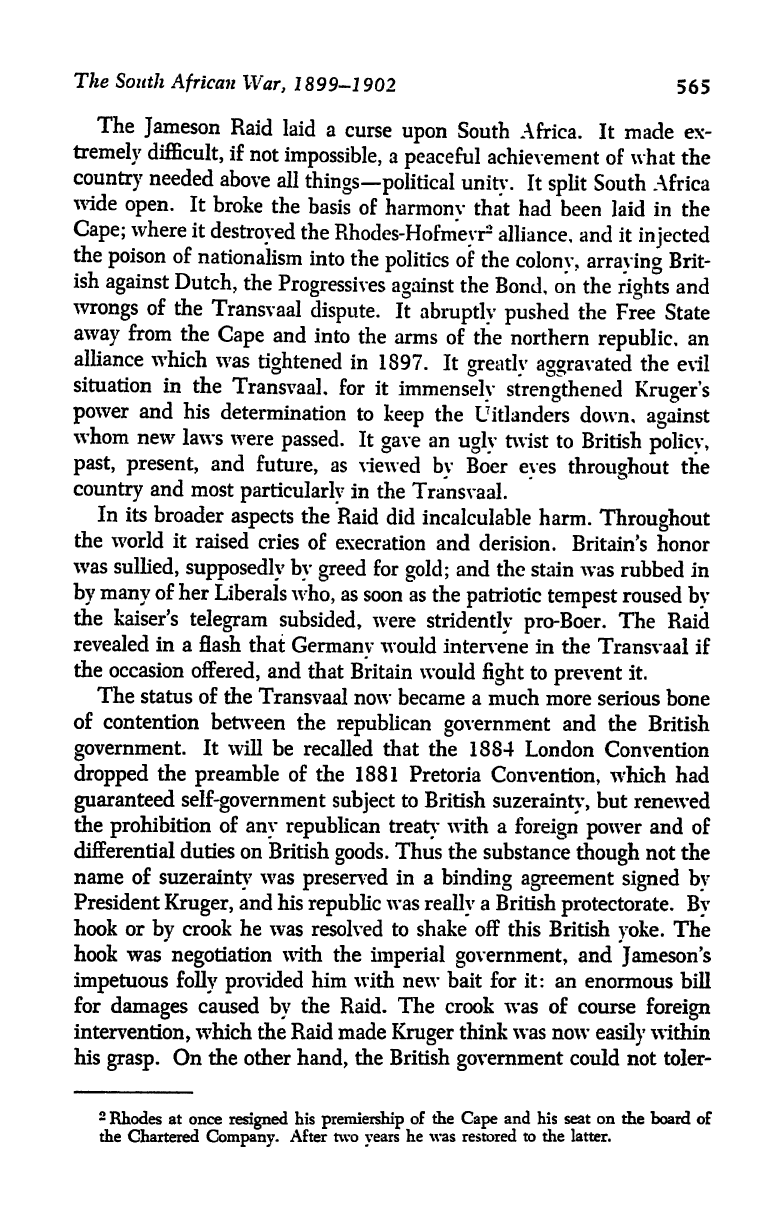
The
South
African
War,
1899-1
902
565
The
Jameson
Raid
laid
a
curse
upon
South
Africa.
It
made ex-
tremely
difficult,
if
not
impossible,
a
peaceful
achievement of what
the
country
needed
above
all
things
political
unity.
It
split
South Africa
wide
open.
It
broke
the
basis
of
harmony
that
had
been
laid
in the
Cape;
where
it
destroyed
the
Rhodes-Hofmeyr
2
alliance,
and it
injected
the
poison
of
nationalism
into
the
politics
of
the
colony,
arraying
Brit-
ish
against
Dutch,
the
Progressives
against
the
Bond,
on
the
rights
and
wrongs
of
the
Transvaal
dispute.
It
abruptly
pushed
the
Free
State
away
from
the
Cape
and
into
the
arms
of the
northern
republic,
an
alliance
which
was
tightened
in
1897.
It
greatly
aggravated
the
evil
situation
in
the
Transvaal,
for
it
immensely
strengthened
Kruger's
power
and
his
determination
to
keep
the
Uitlanders
down,
against
whom new
laws
were
passed.
It
gave
an
ugly
twist
to
British
policy,
past, present,
and
future,
as
viewed
by
Boer
eyes
throughout
the
country
and
most
particularly
in
the
Transvaal.
In its
broader
aspects
the
Raid
did
incalculable harm.
Throughout
the
world it
raised
cries
of
execration
and
derision.
Britain's
honor
was
sullied,
supposedly by
greed
for
gold;
and the
stain
was
rubbed
in
by
many
of
her
Liberals
who,
as
soon
as
the
patriotic
tempest
roused
by
the
kaiser's
telegram
subsided,
were
stridently
pro-Boer.
The
Raid
revealed in
a flash
that
Germany
would intervene
in
the
Transvaal if
the
occasion
offered,
and
that
Britain
would
fight
to
prevent
it.
The
status
of
the
Transvaal now
became a
much
more
serious
bone
of
contention
between
the
republican
government
and the
British
government.
It
will be
recalled that
the 1884
London
Convention
dropped
the
preamble
of the 1881
Pretoria
Convention,
which
had
guaranteed
self-government
subject
to
British
suzerainty,
but
renewed
the
prohibition
of
any
republican
treat}'
with
a
foreign power
and
of
differential
duties
on British
goods.
Thus the
substance
though
not the
name of
suzerainty
was
preserved
in a
binding
agreement signed by
President
Kruger,
and his
republic
was
really
a British
protectorate. By
hook or
by
crook he
was resolved to shake off
this
British
yoke.
The
hook
was
negotiation
with
the
imperial government,
and
Jameson's
impetuous folly provided
him
with
new bait
for
it:
an
enormous bill
for
damages
caused
by
the Raid. The crook
was of
course
foreign
intervention,
which
the Raid
made
Kruger
think was
now
easily
within
his
grasp.
On
the other
hand,
the British
government
could not
toler-
2
Rhodes at once
resigned
his
premiership
of
the
Cape
and
his
seat
on
the board of
the
Chartered
Company.
After
two
years
he was restored
to the
latter.
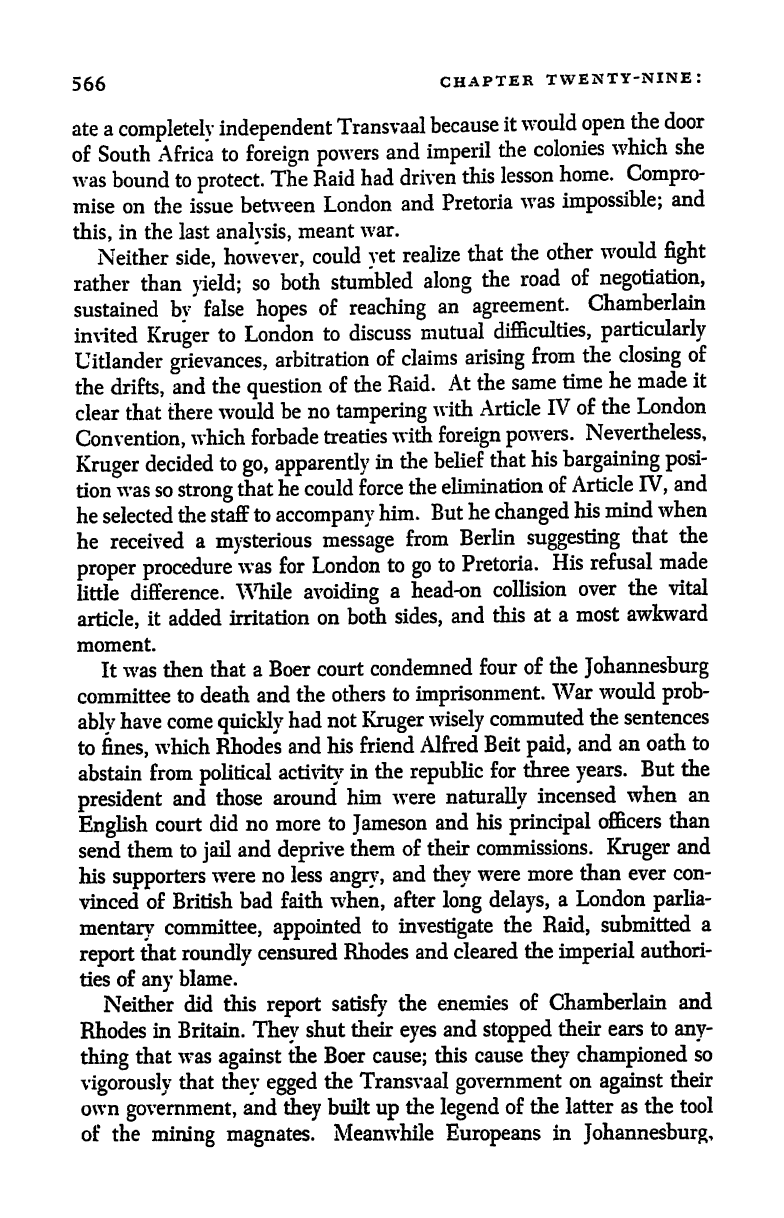
566
CHAPTER
TWENTY-NINE:
ate
a
completely
independent
Transvaal
because
it
would
open
the door
of South
Africa
to
foreign
powers
and
imperil
the
colonies
which
she
was
bound to
protect.
The
Raid
had
driven
this
lesson
home.
Compro-
mise
on
the
issue
between
London
and
Pretoria
was
impossible;
and
this,
in the last
analysis,
meant
war.
Neither
side,
however,
could
yet
realize
that
the
other
would
fight
rather
than
yield;
so
both
stumbled
along
the
road
of
negotiation,
sustained
by'
false
hopes
of
reaching
an
agreement.
Chamberlain
invited
Kruger
to
London
to
discuss
mutual difficulties,
particularly
Uitlander
grievances,
arbitration
of claims
arising
from
the
closing
of
the
drifts,
and
the
question
of
the
Raid.
At
the
same
time
he
made
it
clear
that
there
would
be
no
tampering
with
Article
IV
of
the
London
Convention,
which forbade
treaties
with
foreign
powers.
Nevertheless,
Kruger
decided
to
go,
apparently
in
the
belief
that
his
bargaining
posi-
tion
was so
strong
that
he
could
force
the
elimination
of
Article
IV,
and
he selected
the
staff
to
accompany
him.
But
he
changed
his
mind
when
he
received
a
mysterious
message
from
Berlin
suggesting
that
the
proper
procedure
was for
London
to
go
to
Pretoria.
His
refusal
made
little
difference.
While
avoiding
a
head-on
collision
over
the vital
article,
it added
irritation
on
both
sides,
and
this
at
a
most
awkward
moment.
It
was then
that
a
Boer court
condemned
four
of
the
Johannesburg
committee
to
death
and the
others
to
imprisonment.
War
would
prob-
ably
have
come
quickly
had
not
Kruger
wisely
commuted
the
sentences
to
fines,
which Rhodes
and
his
friend
Alfred
Beit
paid,
and
an oath
to
abstain
from
political
activity
in
the
republic
for
three
years.
But
the
president
and
those
around
him
were
naturally
incensed
when
an
English
court
did
no
more
to
Jameson
and
his
principal
officers
than
send
them
to
jail
and
deprive
them of
their
commissions.
Kruger
and
his
supporters
were
no less
angry,
and
they
were more
than
ever con-
vinced
of
British
bad
faith
when,
after
long
delays,
a
London
parlia-
mentary
committee,
appointed
to
investigate
the
Raid,
submitted
a
report
that
roundly
censured
Rhodes
and
cleared
the
imperial
authori-
ties of
any
blame.
Neither
did
this
report
satisfy
the
enemies
of
Chamberlain
and
Rhodes
in
Britain.
They
shut
their
eyes
and
stopped
their
ears to
any-
thing
that
was
against
the Boer
cause;
this
cause
they
championed
so
vigorously
that
they
egged
the
Transvaal
government
on
against
their
own
government,
and
they
built
up
the
legend
of the
latter as the
tool
of the
mining magnates.
Meanwhile
Europeans
in
Johannesburg,
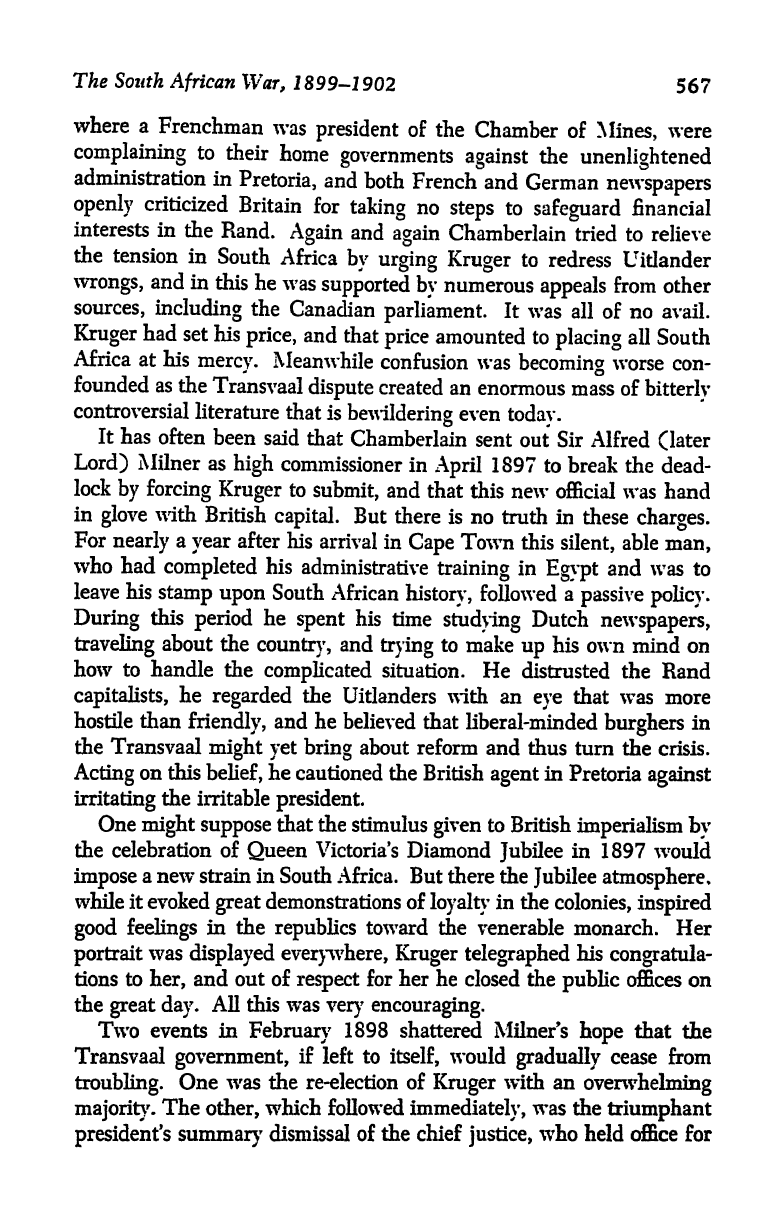
The South
African
War,
1
899-1
902
567
where
a
Frenchman
was
president
of
the
Chamber
of
Mines,
were
complaining
to
their
home
governments
against
the
unenlightened
administration
in
Pretoria,
and
both
French
and
German
newspapers
openly
criticized
Britain
for
taking
no
steps
to
safeguard
financial
interests in
the
Pxand.
Again
and
again
Chamberlain
tried to relieve
the
tension
in
South
Africa
by
urging
Kruger
to
redress Uitlander
wrongs,
and
in
this
he
was
supported
by
numerous
appeals
from other
sources,
including
the
Canadian
parliament.
It
was all of no avail.
Kruger
had
set his
price,
and
that
price
amounted
to
placing
all
South
Africa
at his
mercy.
Meanwhile
confusion
was
becoming
worse con-
founded as
the
Transvaal
dispute
created an
enormous
mass
of
bitterly
controversial
literature
that
is
bewildering
even
today.
It has
often
been
said that
Chamberlain
sent
out
Sir
Alfred
(later
Lord)
Milner
as
high
commissioner
in
April
1897
to break the
dead-
lock
by
forcing
Kruger
to
submit,
and that
this
new
official was
hand
in
glove
with
British
capital.
But
there
is no truth
in these
charges.
For
nearly
a
year
after
his
arrival in
Cape
Town
this
silent,
able
man,
who had
completed
his
administrative
training
in
Egypt
and
was
to
leave
his
stamp
upon
South
African
history,
followed
a
passive
policy.
During
this
period
he
spent
his
time
studying
Dutch
newspapers,
traveling
about
the
country,
and
trying
to
make
up
his own
mind on
how
to handle
the
complicated
situation. He
distrusted
the
Rand
capitalists,
he
regarded
the
Uitlanders
with
an
eye
that was
more
hostile than
friendly,
and he
believed that
liberal-minded
burghers
in
the
Transvaal
might
yet
bring
about reform
and thus turn
the crisis.
Acting
on this
belief,
he
cautioned
the
British
agent
in
Pretoria
against
irritating
the
irritable
president.
One
might
suppose
that
the
stimulus
given
to
British
imperialism
by
the
celebration of
Queen
Victoria's
Diamond
Jubilee
in 1897
would
impose
a
new strain in South
Africa.
But there the
Jubilee
atmosphere,
while it evoked
great
demonstrations of
loyalty
in
the
colonies,
inspired
good feelings
in
the
republics
toward
the
venerable
monarch.
Her
portrait
was
displayed everywhere,
Kruger telegraphed
his
congratula-
tions
to
her,
and out of
respect
for her he closed the
public
offices on
the
great
day.
All this was
very
encouraging.
Two
events in
February
1898
shattered Milner's
hope
that
the
Transvaal
government,
if
left to
itself,
would
gradually
cease from
troubling.
One
was
the
re-election
of
Kruger
with an
overwhelming
majority.
The
other,
which
followed
immediately,
was the
triumphant
president's summary
dismissal
of
the
chief
justice,
who
held office
for
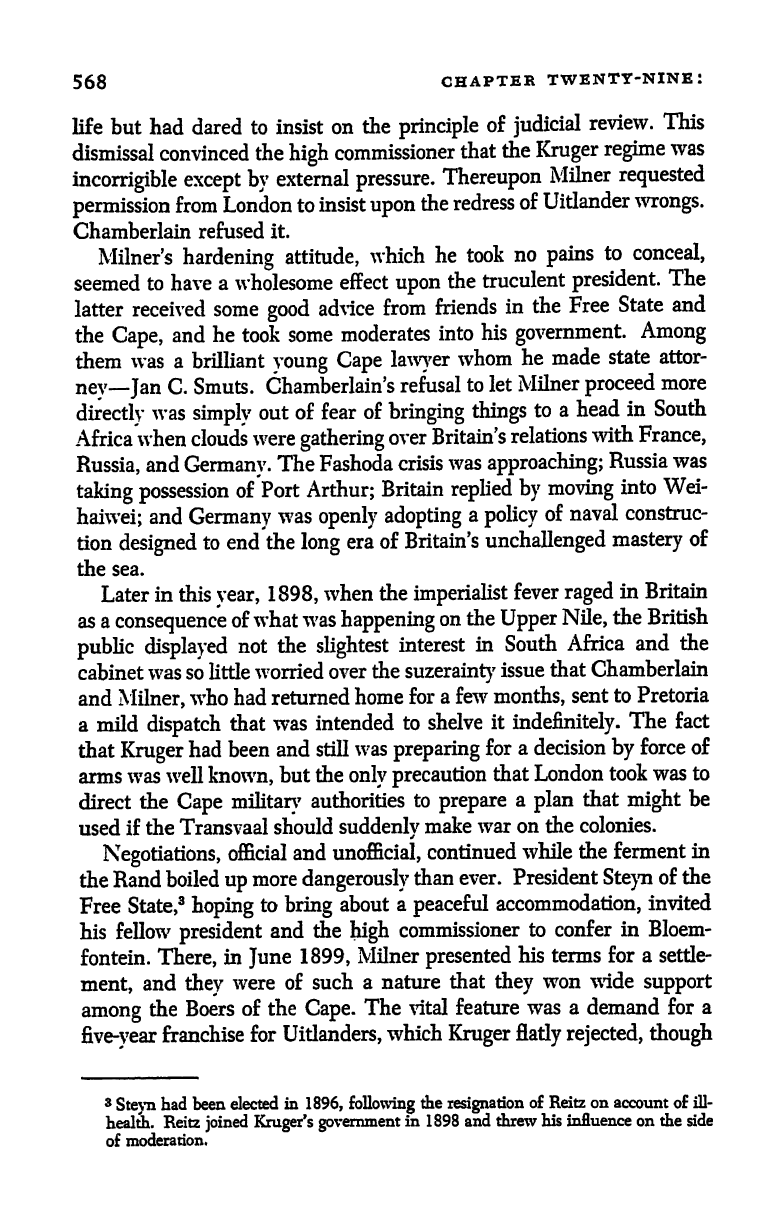
568
CHAPTER
TWENTY-NINE:
life
but
had
dared to
insist
on
the
principle
of
judicial
review.
This
dismissal
convinced
the
high
commissioner
that
the
Kruger
regime
was
incorrigible
except by
external
pressure.
Thereupon
Milner
requested
permission
from
London to
insist
upon
the
redress
of
Uitlander
wrongs.
Chamberlain
refused it.
Milner's
hardening
attitude,
which
he
took
no
pains
to
conceal,
seemed
to
have
a
wholesome
effect
upon
the
truculent
president.
The
latter
received
some
good
advice
from
friends
in
the
Free
State and
the
Cape,
and
he
took
some
moderates
into
his
government.
Among
them
was a
brilliant
young
Cape
lawyer
whom
he
made
state
attor-
neyJan
C.
Smuts.
Chamberlain's
refusal
to let
Milner
proceed
more
directly
was
simply
out
of fear
of
bringing
things
to
a
head
in South
Africa
when
clouds
were
gathering
over
Britain's
relations
with
France,
Russia,
and
Germany.
The
Fashoda
crisis
was
approaching;
Russia
was
taking
possession
of Port
Arthur;
Britain
replied
by
moving
into
Wei-
haiwei;
and
Germany
was
openly
adopting
a
policy
of
naval
construc-
tion
designed
to end
the
long
era
of
Britain's
unchallenged
mastery
of
the sea.
Later
in
this
year,
1898,
when
the
imperialist
fever
raged
in
Britain
as a
consequence
of what
was
happening
on
the
Upper
Nile,
the British
public
displayed
not
the
slightest
interest
in South
Africa
and
the
cabinet
was
so little
worried
over
the
suzerainty
issue
that Chamberlain
and
Milner,
who
had returned
home
for
a few
months,
sent
to
Pretoria
a
mild
dispatch
that
was
intended
to
shelve
it
indefinitely.
The
fact
that
Kruger
had been
and still
was
preparing
for
a
decision
by
force of
arms
was
well
known,
but
the
only
precaution
that London
took
was to
direct
the
Cape
military
authorities
to
prepare
a
plan
that
might
be
used
if
the Transvaal
should
suddenly
make
war
on the
colonies.
Negotiations,
official
and
unofficial,
continued
while
the ferment
in
the
Rand
boiled
up
more
dangerously
than
ever.
President
Steyn
of
the
Free
State,
3
hoping
to
bring
about
a
peaceful
accommodation,
invited
his
fellow
president
and
the
high
commissioner
to confer
in Bloem-
fontein.
There,
in
June
1899,
Milner
presented
his terms for
a
settle-
ment,
and
they
were
of such
a nature
that
they
won wide
support
among
the
Boers
of the
Cape.
The vital
feature
was a
demand
for
a
five-year
franchise
for
Uitlanders,
which
Kruger
flatly
rejected,
though
3
Steyn
had
been
elected
in
1896,
following
the
resignation
of Reitz on
account of
ill-
health.
Reitz
joined
Kruger's government
in
1398 and threw
his influence on the side
of
moderation.
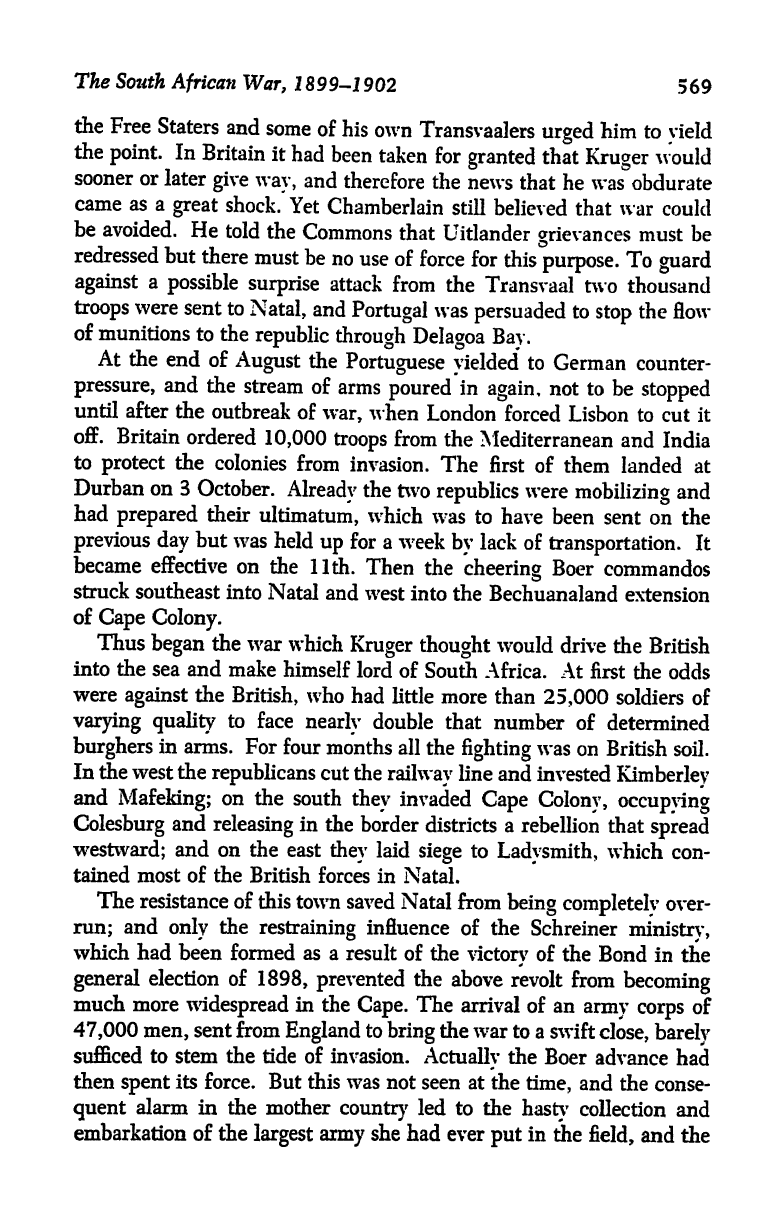
The
South
African
War,
1
899-1
902
569
the
Free
Staters
and
some
of
his own
Transvaalers
urged
him
to
yield
the
point.
In
Britain
it
had
been
taken
for
granted
that
Kruger
Would
sooner
or
later
give
way,
and
therefore the
news that
he was
obdurate
came as a
great
shock.
Yet
Chamberlain
still
believed that war
could
be
avoided.
He
told
the
Commons
that
Uitlander
grievances
must
be
redressed
but
there
must
be
no
use
of
force
for
this
purpose.
To
guard
against
a
possible
surprise
attack
from
the
Transvaal
two
thousand
troops
were
sent to
Natal,
and
Portugal
was
persuaded
to
stop
the
flow
of
munitions
to the
republic
through
Delagoa
Bay.
At
the
end
of
August
the
Portuguese
yielded
to
German
counter-
pressure,
and the
stream
of
arms
poured
in
again,
not to
be
stopped
until after
the
outbreak
of
war,
when
London
forced
Lisbon to cut it
off.
Britain
ordered
10,000
troops
from
the
Mediterranean
and
India
to
protect
the
colonies
from
invasion.
The first
of them
landed at
Durban on 3
October.
Already
the
two
republics
were
mobilizing
and
had
prepared
their
ultimatum,
which
was to
have
been
sent on
the
previous
day
but
was
held
up
for a week
by
lack
of
transportation.
It
became
effective on
the
llth.
Then
the
cheering
Boer
commandos
struck
southeast
into
Natal
and
west
into
the
Bechuanaland
extension
of
Cape
Colony.
Thus
began
the
war
which
Kruger
thought
would drive
the
British
into the sea
and
make
himself
lord of
South
Africa. At
first
the odds
were
against
the
British,
who
had little
more than
25,000
soldiers of
varying
quality
to
face
nearly
double
that
number
of
determined
burghers
in
arms.
For four
months
all the
fighting
was
on
British soil.
In the
west
the
republicans
cut
the
railway
line
and
invested
Kimberley
and
Mafeking;
on the
south
they
invaded
Cape
Colony,
occupying
Colesburg
and
releasing
in
the
border
districts a
rebellion that
spread
westward;
and
on the
east
they
laid
siege
to
Ladysmith,
which
con-
tained most of the
British
forces
in
Natal.
The resistance
of this
town
saved
Natal from
being
completely
over-
run;
and
only
the
restraining
influence
of the
Schreiner
ministry,
which
had been formed as a
result of
the
victory
of the
Bond in
the
general
election of
1898,
prevented
the
above
revolt from
becoming
much
more
widespread
in the
Cape.
The
arrival
of
an
army
corps
of
47,000
men,
sent
from
England
to
bring
the war
to a
swift
close,
barely
sufficed to stem the tide
of
invasion.
Actually
the
Boer
advance
had
then
spent
its
force.
But this
was
not seen
at
the
time,
and
the
conse-
quent
alarm
in the mother
country
led
to
the
hasty
collection
and
embarkation
of
the
largest
army
she had ever
put
in
die
field,
and
the
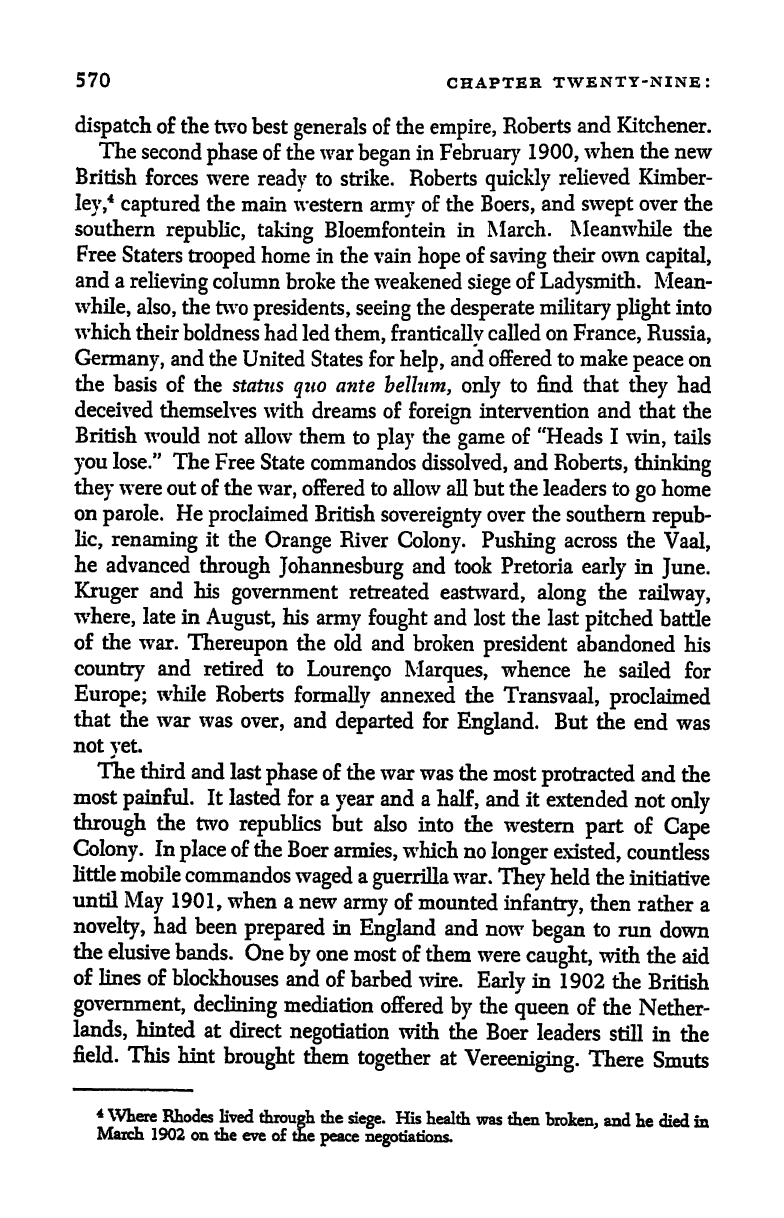
570
CHAPTER
TWENTY-NINE:
dispatch
of the
two
best
generals
of
the
empire,
Roberts
and Kitchener.
The
second
phase
of the war
began
in
February
1900,
when the
new
British
forces
were
ready
to
strike. Roberts
quickly
relieved
Kimber-
ley,
4
captured
the
main
western
army
of
the
Boers,
and
swept
over
the
southern
republic,
taking
Bloemfontein
in
March.
Meanwhile
the
Free
Staters
trooped
home in the vain
hope
of
saving
their own
capital,
and a
relieving
column
broke
the weakened
siege
of
Ladysmith.
Mean-
while,
also,
the
two
presidents, seeing
the
desperate
military
plight
into
which
their
boldness
had
led
them,
frantically
called
on
France,
Russia,
Germany,
and the
United
States for
help,
and
offered
to make
peace
on
the
basis
of
the status
quo
ante
belhim,
only
to find
that
they
had
deceived
themselves with
dreams of
foreign
intervention and
that
the
British
would
not
allow them
to
play
the
game
of "Heads
I
win,
tails
you
lose/
1
The
Free
State
commandos
dissolved,
and
Roberts,
thinking
they
were out
of the
war,
offered
to
allow
all
but the leaders to
go
home
on
parole.
He
proclaimed
British
sovereignty
over the southern
repub-
lic,
renaming
it
the
Orange
River
Colony.
Pushing
across
the
Vaal,
he
advanced
through
Johannesburg
and took Pretoria
early
in
June.
Kruger
and
his
government
retreated
eastward,
along
the
railway,
where,
late
in
August,
his
army fought
and lost the
last
pitched
battle
of the war.
Thereupon
the
old
and
broken
president
abandoned
his
country
and
retired to
Lourengo
Marques,
whence
he
sailed
for
Europe;
while
Roberts
formally
annexed
the
Transvaal,
proclaimed
that
the
war
was
over,
and
departed
for
England.
But
the
end
was
not
yet.
The
third
and last
phase
of
the war
was
the
most
protracted
and
the
most
painful.
It
lasted
for
a
year
and
a
half,
and
it
extended
not
only
through
the
two
republics
but
also
into the
western
part
of
Cape
Colony.
In
place
of
die
Boer
armies,
which
no
longer
existed,
countless
little
mobile
commandos
waged
a
guerrilla
war.
They
held the
initiative
until
May
1901,
when
a new
army
of
mounted
infantry,
then
rather a
novelty,
had
been
prepared
in
England
and
now
began
to
run
down
the
elusive
bands.
One
by
one
most
of them
were
caught,
with
the
aid
of
lines
of
blockhouses
and
of
barbed wire.
Early
in
1902
the
British
government,
declining
mediation
offered
by
the
queen
of
the
Nether-
lands,
hinted
at
direct
negotiation
with
the
Boer
leaders
still
in
the
field.
This
hint
brought
them
together
at
Vereeniging.
There
Smuts
*
Where
Rhodes
lived
through
the
siege.
His
health
was
then
broken,
and
he
died
in
Match
1902
on the
eve
of
the
peace
negotiations.
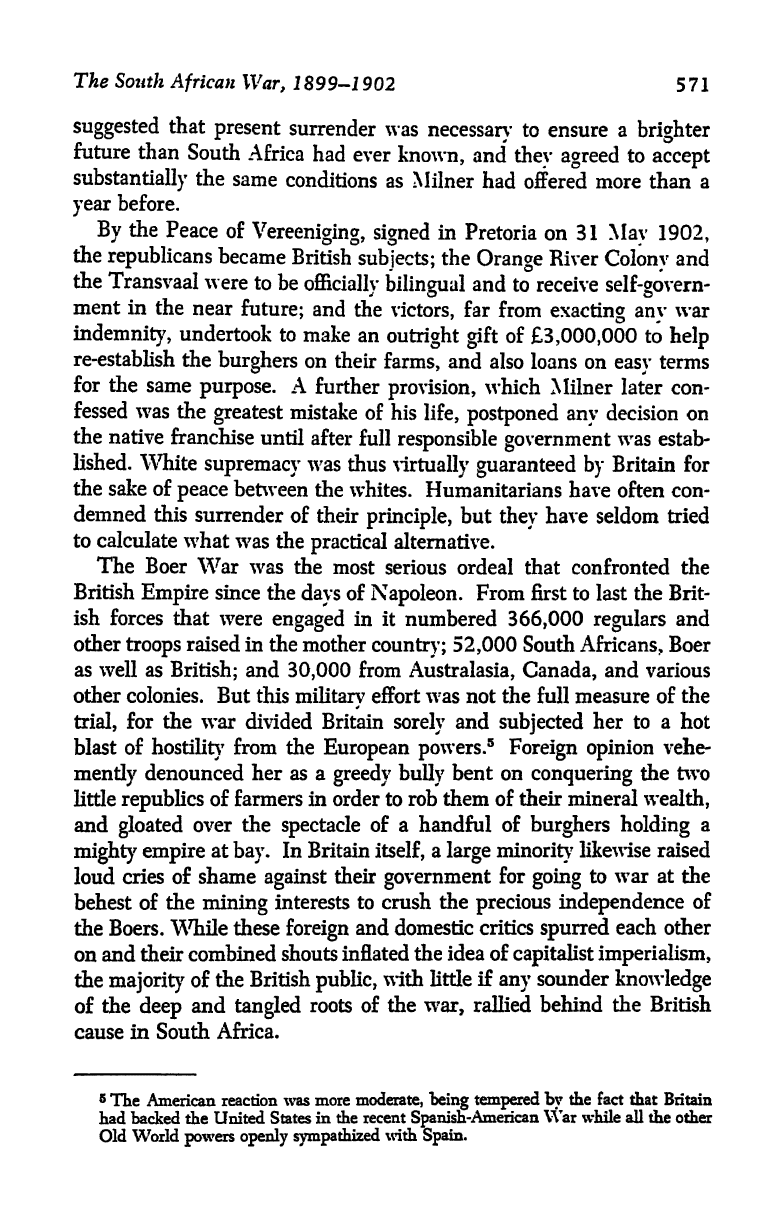
The
South
African
War,
1899-1902
571
suggested
that
present
surrender was
necessary
to ensure
a
brighter
future
than
South
Africa
had ever
known,
and
they
agreed
to
accept
substantially
the
same
conditions as
Milner
had offered
more
than
a
year
before.
By
the
Peace of
Vereeniging,
signed
in
Pretoria
on 31
May
1902,
the
republicans
became
British
subjects;
the
Orange
River
Colony
and
the
Transvaal
were
to be
officially
bilingual
and to receive
self-govern-
ment in
the
near
future;
and the
victors,
far
from
exacting
any
war
indemnity,
undertook to
make an
outright
gift
of
3,000,000
to
help
re-establish
the
burghers
on their
farms,
and
also
loans on
easy
terms
for
the same
purpose.
A
further
provision,
which
Milner later con-
fessed
was
the
greatest
mistake
of his
life,
postponed
any
decision on
the
native
franchise
until
after
full
responsible
government
w
T
as estab-
lished. White
supremacy
was
thus
virtually
guaranteed
by
Britain
for
the
sake of
peace
between
the
whites. Humanitarians have
often
con-
demned
this
surrender of
their
principle,
but
they
have
seldom tried
to calculate
what
was the
practical
alternative.
The Boer
War
was
the
most
serious ordeal
that
confronted the
British
Empire
since the
days
of
Napoleon.
From first to last
the Brit-
ish
forces that w
r
ere
engaged
in it
numbered
366,000
regulars
and
other
troops
raised in the
mother
country;
52,000
South
Africans,
Boer
as
well as
British;
and
30,000
from
Australasia, Canada,
and various
other colonies.
But
this
military
effort was not the full measure
of
the
trial,
for
the war
divided
Britain
sorely
and
subjected
her to
a
hot
blast of
hostility
from the
European
powers.
5
Foreign opinion
vehe-
mently
denounced
her
as a
greedy bully
bent on
conquering
the
two
little
republics
of
farmers in order
to
rob
them
of
their
mineral
wealth,
and
gloated
over the
spectacle
of a
handful
of
burghers
holding
a
mighty
empire
at
bay.
In Britain
itself,
a
large
minority
likewise raised
loud
cries of
shame
against
their
government
for
going
to
war
at
the
behest
of
the
mining
interests to crush
the
precious independence
of
the Boers. While
these
foreign
and domestic
critics
spurred
each
other
on
and
their combined
shouts
inflated
the idea
of
capitalist
imperialism,
the
majority
of
the
British
public,
with little if
any
sounder
knowledge
of the
deep
and
tangled
roots of
the
war,
rallied behind
the
British
cause in South Africa.
5
The American
reaction
was
more
moderate,
being
tempered
by
the
fact that Britain
had backed the
United States
in
the recent
Spanish-American
War while all
the
other
Old
World
powers
openly
sympathized
with
Spain.
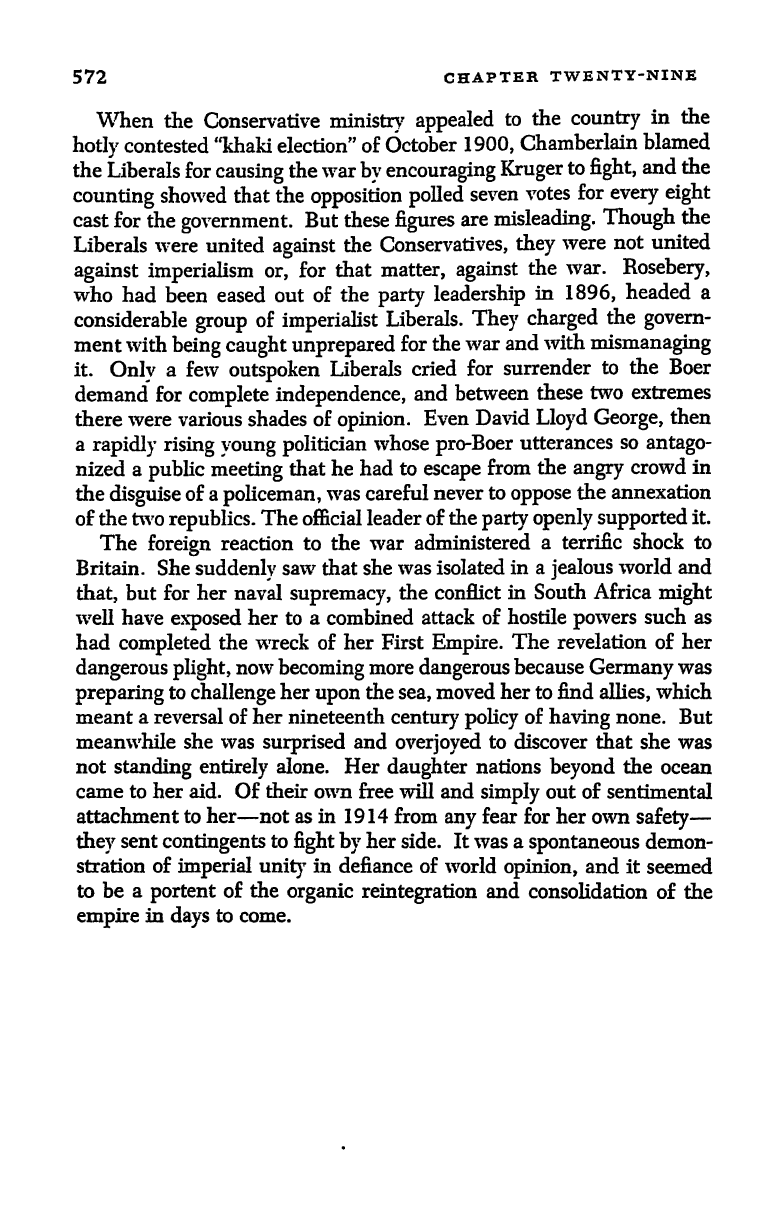
572
CHAPTER
TWENTY-NINE
When
the
Conservative
ministry appealed
to
the
country
in
the
hotly
contested
"khaki
election"
of October
1900,
Chamberlain
blamed
the
Liberals
for
causing
the war
by
encouraging
Kruger
to
fight,
and the
counting
showed
that the
opposition
polled
seven
votes
for
every
eight
cast
for the
government.
But these
figures
are
misleading.
Though
the
Liberals were
united
against
the
Conservatives,
they
were
not united
against
imperialism
or,
for
that
matter,
against
the
war.
Rosebery,
who
had been eased
out of
the
party
leadership
in
1896,
headed a
considerable
group
of
imperialist
Liberals.
They
charged
the
govern-
ment
with
being caught
unprepared
for
the
war
and
with
mismanaging
it.
Only
a
few
outspoken
Liberals
cried for
surrender
to
the
Boer
demand
for
complete
independence,
and
between
these
two
extremes
there were various shades
of
opinion.
Even
David
Lloyd George,
then
a
rapidly
rising
young
politician
whose
pro-Boer
utterances
so
antago-
nized a
public
meeting
that he
had to
escape
from
the
angry
crowd
in
the
disguise
of a
policeman,
was careful
never
to
oppose
the
annexation
of
the
two
republics.
The official leader
of
the
party
openly
supported
it.
The
foreign
reaction to
the war administered
a terrific shock
to
Britain. She
suddenly
saw
that
she
was isolated
in
a
jealous
world and
that,
but for
her
naval
supremacy,
the conflict
in South Africa
might
well have
exposed
her
to
a
combined
attack
of
hostile
powers
such as
had
completed
the
wreck
of her First
Empire.
The
revelation
of
her
dangerous plight,
now
becoming
more
dangerous
because
Germany
was
preparing
to
challenge
her
upon
the
sea,
moved
her
to
find
allies,
which
meant
a
reversal of her nineteenth
century policy
of
having
none.
But
meanwhile
she
was
surprised
and
overjoyed
to
discover
that
she was
not
standing
entirely
alone.
Her
daughter
nations
beyond
the
ocean
came to her aid. Of
their
own
free will
and
simply
out
of
sentimental
attachment to
her not
as
in 1914
from
any
fear
for
her
own
safety
they
sent
contingents
to
fight
by
her
side. It was a
spontaneous
demon-
stration
of
imperial unity
in
defiance of
world
opinion,
and it
seemed
to be
a
portent
of
the
organic
reintegration
and
consolidation of
the
empire
in
days
to come.
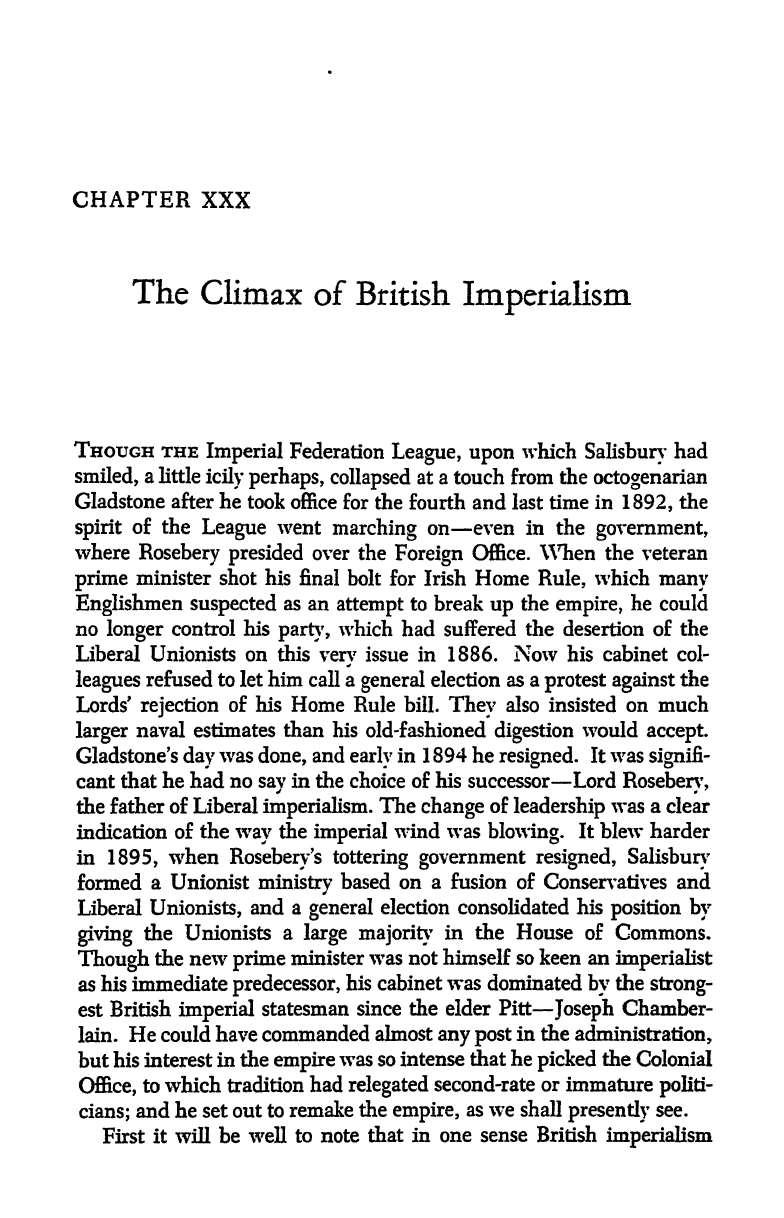
CHAPTER
XXX
The
Climax
of British
Imperialism
THOUGH THE
Imperial
Federation
League,
upon
which
Salisbury
had
smiled,
a
little
icily
perhaps,
collapsed
at a
touch
from the
octogenarian
Gladstone after
he
took
office for the
fourth and last
time in
1892,
the
spirit
of the
League
went
marching
on even
in the
government,
where
Rosebery
presided
over the
Foreign
Office.
When the
veteran
prime
minister shot his
final
bolt
for
Irish
Home
Rule,
which
many
Englishmen suspected
as
an
attempt
to
break
up
the
empire,
he could
no
longer
control his
party,
which had suffered
the
desertion
of
the
Liberal Unionists on this
very
issue in 1886.
Now
his cabinet
col-
leagues
refused to let him call a
general
election as a
protest against
the
Lords'
rejection
of his Home
Rule bill.
They
also insisted
on much
larger
naval estimates
than his
old-fashioned
digestion
would
accept.
Gladstone's
day
was
done,
and
early
in 1
894
he
resigned.
It
was
signifi-
cant
that
he had
no
say
in the
choice of
his successor Lord
Rosebery,
the father
of Liberal
imperialism.
The
change
of
leadership
was
a
clear
indication
of
the
way
the
imperial
wind
was
blowing.
It blew
harder
in
1895,
when
Rosebery's tottering
government
resigned,
Salisbury
formed
a
Unionist
ministry
based
on
a
fusion of Conservatives and
Liberal
Unionists,
and a
general
election
consolidated
his
position by
giving
the Unionists
a
large majority
in the House
of Commons.
Though
the
new
prime
minister was not himself
so
keen an
imperialist
as his
immediate
predecessor,
his
cabinet
was
dominated
by
the
strong-
est
British
imperial
statesman
since
the
elder
Pitt
Joseph
Chamber-
lain.
He could
have commanded
almost
any post
in the
administration,
but
his
interest in
the
empire
was so intense
that
he
picked
the
Colonial
Office,
to which
tradition
had
relegated
second-rate
or
immature
politi-
cians;
and
he set out
to
remake
the
empire,
as we
shall
presently
see.
First
it will
be well
to note
that
in
one sense British
imperialism
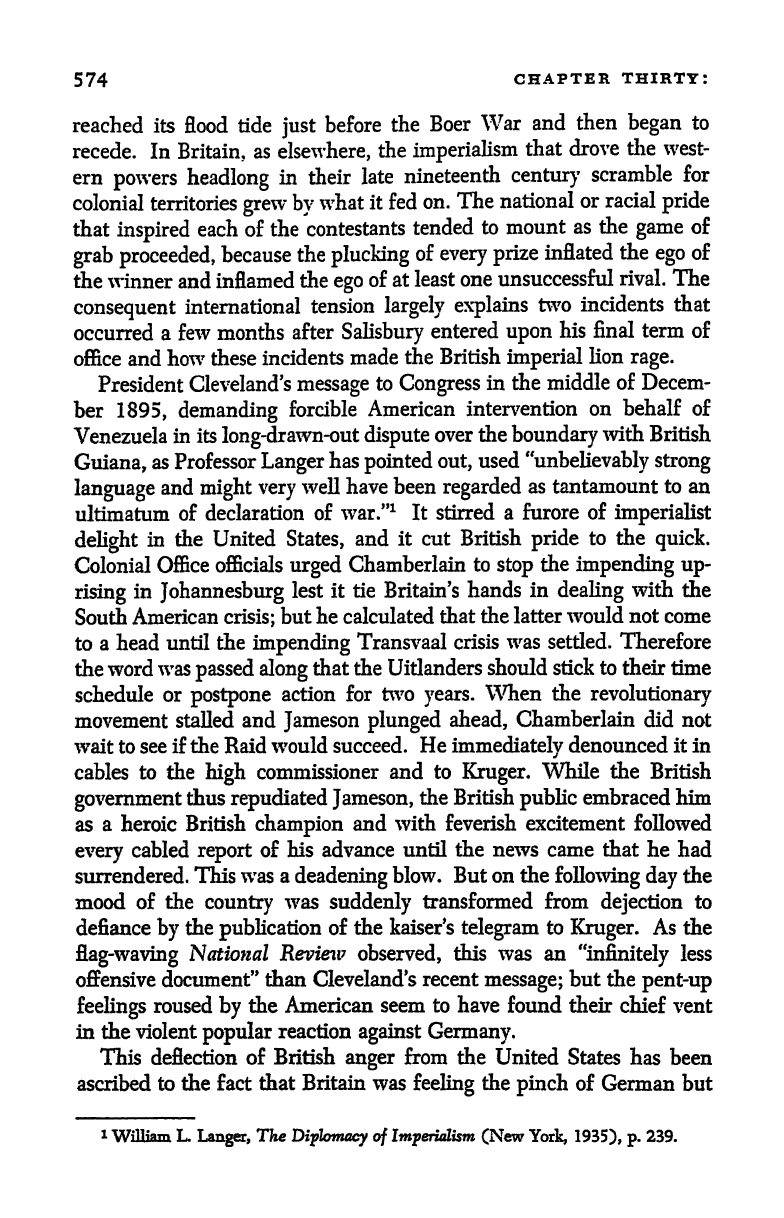
574
CHAPTER
THIRTY:
reached
its flood
tide
just
before
the
Boer
War
and
then
began
to
recede. In
Britain,
as
elsewhere,
the
imperialism
that
drove
the
west-
ern
powers
headlong
in their
late
nineteenth
century
scramble for
colonial
territories
grew
by
what
it fed
on.
The
national
or racial
pride
that
inspired
each of
the contestants
tended
to
mount
as the
game
of
grab
proceeded,
because
the
plucking
of
every
prize
inflated
the
ego
of
the winner and inflamed
the
ego
of
at least
one
unsuccessful
rival.
The
consequent
international
tension
largely
explains
two
incidents that
occurred a few
months
after
Salisbury
entered
upon
his
final
term of
office
and how
these
incidents
made
the British
imperial
lion
rage.
President
Cleveland's
message
to
Congress
in
the
middle
of Decem-
ber
1895,
demanding
forcible
American
intervention
on behalf
of
Venezuela
in
its
long-drawn-out
dispute
over
the
boundary
with
British
Guiana,
as Professor
Langer
has
pointed
out,
used
"unbelievably
strong
language
and
might
very
well
have
been
regarded
as tantamount
to
an
ultimatum
of
declaration
of
war."
1
It
stirred a furore
of
imperialist
delight
in
the United
States,
and
it cut British
pride
to
the
quick.
Colonial
Office
officials
urged
Chamberlain
to
stop
the
impending
up-
rising
in
Johannesburg
lest
it tie Britain's
hands
in
dealing
with the
South
American
crisis;
but he calculated
that
the latter
would not come
to
a head
until
the
impending
Transvaal
crisis
was settled.
Therefore
the
word
was
passed along
that the Uitlanders
should
stick to their time
schedule
or
postpone
action
for
two
years.
When the
revolutionary
movement
stalled
and
Jameson
plunged
ahead,
Chamberlain did not
wait
to see
if the Raid
would
succeed.
He
immediately
denounced
it in
cables
to
the
high
commissioner
and to
Kruger.
While
the
British
government
thus
repudiated
Jameson,
the British
public
embraced him
as
a
heroic
British
champion
and
with
feverish
excitement
followed
every
cabled
report
of
his advance
until
the news came that
he
had
surrendered.
This
was
a
deadening
blow.
But on the
following
day
the
mood
of the
country
was
suddenly
transformed from
dejection
to
defiance
by
the
publication
of
the kaiser's
telegram
to
Kruger.
As the
flag-waving
National
Revieiv
observed,
this was an
"infinitely
less
offensive document"
than Cleveland's
recent
message;
but
the
pent-up
feelings
roused
by
the
American
seem
to have found their
chief vent
in the violent
popular
reaction
against
Germany.
This
deflection of
British
anger
from the
United
States
has
been
ascribed
to
the
fact
that Britain was
feeling
the
pinch
of
German
but
i
William
L.
Langer,
The
Diplomacy
of
Imperialism
(New York,
1935),
p.
239.
